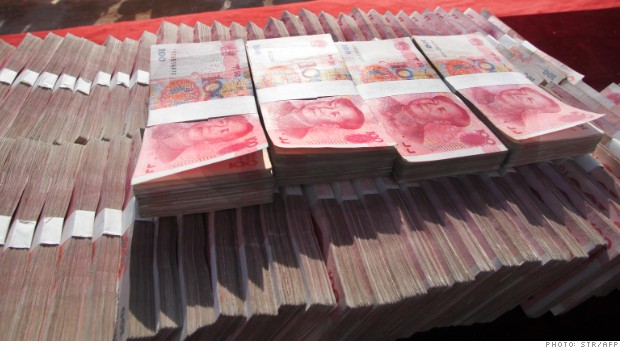China loosens grip on its currency
Mar 17, 2014

China's central bank has further loosened its hold on the yuan, making a big move that gives teeth to a government pledge to move toward a more market-driven economy.
The People's Bank of China announced Saturday that it would double the allowable trading range for the yuan against the dollar to 2% from a midpoint rate it sets every day.
The change, which is effective Monday, means the yuan will go up and down in value more than it has in the past.
Related: China to fight pollution with drones
While the move had been largely expected, as the yuan was already trading in the last month at a wider range than usual, the announcement remains significant for a government that has always tightly controlled the exchange rate to keep it at favorable terms.
In fact, it's been nearly two years since the government broadened the yuan's trading range.
Related: Why ex-pats are ditching their passports
China has touted a goal of opening up its economy since President Xi Jinping took his post a year ago, including unwinding tight currency controls and allowing greater foreign investment. And experts say, so far, so good.
"From a macro perspective, today's band widening shows Beijing's determination to speed up financial reforms," HSBC analysts Paul Mackel and Qu Hongbin wrote in a research note. "A wider trading band should pave the way for a more flexible exchange rate and capital account convertibility."
Many investors have always viewed the yuan, also called the renminbi, as a safe bet -- a one-way appreciation game.
But the Chinese government is now trying to show that its currency markets are just as susceptible to outside factors. Doing so may boost outside confidence in the yuan and help promote offshore hubs for the currency -- an endeavor the government is eager to promote.
The central bank said in a statement that it would continue to promote two-way flexibility, while keeping the yuan "fundamentally stable within reasonable and balanced levels."
"As financial reforms pick up pace, there will be more two-way cross-border capital flows," according to HSBC. "Increasing two-way capital flows, greater RMB flexibility and wider usage of the RMB in trade and investment are likely to be the new normal in the next few years."
Given that, the volatility of the yuan will continue, experts say. HSBC expects $1 to eventually equal 5.98 yuan at the end of the year.
Source: CNN MONEY